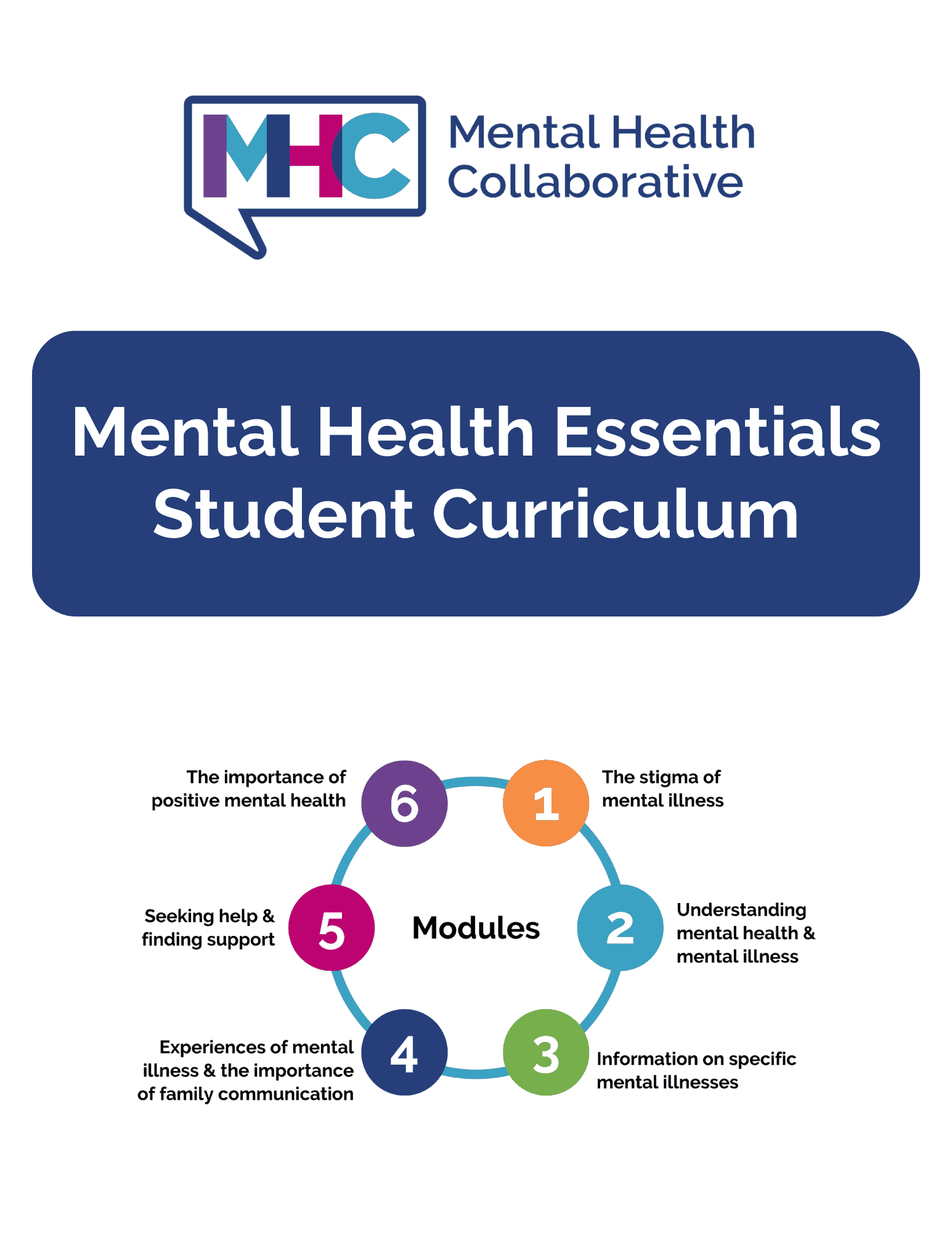Mental Health Essentials Student Curriculum
MODALITY: curriculum

To request comprehensive training (and an adapted US version), visit The Mental Health Collaborative. To get started, scroll down to the form at the bottom of the page and enter your information to be contacted about the training that's right for you and your classroom.

Summary
This course has been designed for educators working with students in grades 7 to 12.
This is a non-credit, online curriculum that consists of 6 modules designed to be taught sequentially in 6-12 hours of classroom time. Modules include all course materials including learning objectives, lesson plans and all materials needed to deliver the curriculum in perpetuity. All student-facing materials are also translated into Spanish and Portuguese. Also includes one year of data collection and analysis via Osprey Research Group (pre/post surveys). After analysis, lifetime access to curriculum updates and quarterly Community of Practice Meeting access.
Learn more about this course, including program background and learning objectives, at Mental Health Collaborative.
Mental health literacy is the foundation for mental health promotion, prevention, and care and can be developed through classroom based curriculum implementation that has been scientifically shown to improve mental health related outcomes for students and also for their teachers. Curriculum aligns with National Health Education Standards and CASEL competencies.
In this course, educators will learn how to apply this classroom-ready, web-based, modular mental health curriculum resource as well as develop their own mental health literacy. Educators can then use this resource designed to be delivered to regular classrooms to successfully address mental health-related curriculum outcomes designed to be delivered by classroom teachers to students in grades 7 to 12.
Implementation
Program Material Cost
Comprehensive, school-based training, $2,000-6,000, depending on chosen training elements and delivery method via the Mental Health Collaborative and includes data collection on implemented programs.
Modality
Classroom Curriculum
Setting
Health Classes and Other
Grade Level(s)
Middle
High
Rubric and Standards
Mental Health Literacy Components
Decreasing stigma
Understanding how to foster and maintain positive mental health
Understanding how to seek help effectively
Understanding mental health disorders and their treatments
High School Learning Standards
Advocate for reducing stigma associated with emotional and mental and behavioral health
Compare & contrast emotional, mental-behavioral illness, mental well-being and concurrent disorders
Describe how self-harm or suicide impacts other people
Describe laws related to minors accessing mental health care
Explain how to help someone who is thinking about attempting suicide
Identify school and community resources that can help a person with emotional, mental and behavioral health concerns
Training Resources
Overview
There are training programs for this curriculum available through Mental Health Collaborative for both staff and community members.
Training Type
Staff Training and Community Awareness Training
Evidence
Publication Types
5 Publications (3 Peer-Reviewed)
Study Types
1 Randomized Control Trial, 5 Single Group Designs
Study Samples
Countries: Canada, US Sample Sizes: Ranged from 60 to 534 Students Grade Levels: Ranged from 6th to 12th Grade
Major Findings
Student receiving curriculum experienced significant increases in mental health knowledge scores and positive attitudes towards mental illness (i.e. stigma reduction) which sustained in follow-up assessments (which ranged from 1 month to 1 year).
Published Studies
Published
Study Type
Sample
Findings
From pretest to posttest, adolescents’ mental health knowledge and attitudes toward help-seeking significantly increased, while mental health stigma significantly decreased. These changes were sustained at 1- month follow-up. The results highlight the importance of brief mental health literacy interventions to encourage healthy coping and help-seeking and to dispel stigmatizing beliefs.
Published
Study Type
Sample
Findings
Student receiving curriculum experienced significant increases in knowledge scores and positive attitudes towards mental illness (i.e.
stigma reduction), which maintained at 1-year follow-up.
Published
Study Type
Sample
Findings
Student receiving curriculum experienced significant increases in knowledge scores and positive attitudes towards mental illness (i.e. stigma reduction).
Published
Study Type
Sample
Findings
Student receiving curriculum experienced significant increases in knowledge scores and positive attitudes towards mental illness (i.e. stigma reduction). Improvement in mental health knowledge predicted a corresponding improvement in attitudes toward mental illness/reduction in stigma.
Published
Study Type
Sample
Findings
Student receiving curriculum experienced significant increases in knowledge scores and positive attitudes towards mental illness (i.e. stigma reduction), which maintained at 2-month follow-up
